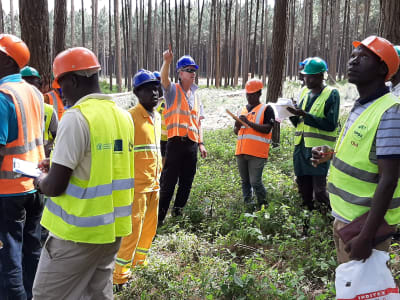FSC Certification is often said to be out of the reach of communities and small growers, due to the onerous requirements of this standard. But over the last 18 months, it has been shown that when interpreting the FSC standard at its core, then it is quite flexible and accommodating to small growers and thus being an all-inclusive standard that can address responsible forest management from the smallest charcoal producer in the rural Eastern Cape of South Africa, to the very large plantation companies in South Africa and elsewhere across the African continent.
The green world of today
We are living in times of circular economies, carbon trading, and the green business is on everyone’s lips. In September 2015, the United Nations (UN) adopted the 2030 Agenda for Sustainable Development. This is intended to be a “plan of action for people, planet and prosperity” and “seeks to strengthen universal peace in larger freedom” (UN, 2015). It sets the priority to eradicate poverty in all its forms and dimensions, which is seen as an indispensable requirement for sustainable development.
Certification of small- scale growers
CMO, in recent years, has entered the FSC small grower certification market and has identified what the past perceived constraints were too small grower FSC certification and devise solutions to overcome these. It quickly became clear that the main constraint is not tied to either of the two certification schemes, but rather to meet the legal requirements in a particular country. Furthermore, all FSC group schemes in South Africa are paper-heavy and over-designed, outside the scope of the FSC standards themselves. So, to solve these issues, software was developed over the last two years and that has now been implemented in several countries across the world – particularly with small growers. The key to successfully scaling small growers lies in CMO’s obsession with simplicity in the systems being rolled out in the field with rural communities. CMO has managed to create the largest FSC certificate on the continent in two short years in Namibia by applying this approach. In South Africa, CMO has also shown the power of simplicity by rolling out FSC certification with communities with ease over the last 12 months. A new addition to the FSC armory is the funding that can now be raised by adding ecosystem services to the scope of your FSC certification – something CMO is already pursuing in both Namibia and South Africa. After-care requires a predetermined follow-up program to be defined and documented for a period that will ensure that the services protected in the ecosystem are indeed restored in the long term. In South Africa, the focus is on water, while CMO is focusing on forest restoration in Namibia, by thinning out the heavily encroached woodlands. The level of restoration is measured and reported annually to the relevant certification body.

CMO group developed an a mobile App to assist small growers with the certification process
Scaling FSC certification across Africa
Scaling of group schemes for smallholders is no longer an issue, and with the future of plantation forestry expansion in Africa lying squarely in the hands of the small grower, FSC is the system of choice to access an increasingly cautious market. CMO is equally well-placed to extend its working model of FSC Group scheme certification into Zimbabwe by launching a national group scheme in the country.
One last piece of the puzzle that has been missing, is the availability of a trading portal for certified FSC products to unblock the supply chain. Such a portal is currently under development and will be operational by the end of 2021. This will then allow the poorest of the poor to have direct access to selling their certified product, such as FSC certified charcoal, the largest supermarket chain in the world. As the saying goes: “Think globally but act locally!”


